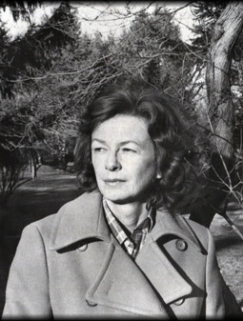
Williams’ writing career began in 1948, when she won the Mademoiselle college fiction contest her junior year at Bard College. The story she submitted, “Rain Later,” also garnered an honorable mention in the 1949 edition of Best American Short Stories.
Following that triumph, Williams decided to intensify her energies on writing. Shortly after reading The Sound and the Fury, she paid an impromptu visit to William Faulkner’s home. Once the two met, they embarked on an enduring friendship, as well as a five-year relationship. The pair exchanged hundreds of letters, most of which focused on their writing, not romance.
While corresponding with Faulkner, Williams’ writing flourished, and her story “The Morning and the Evening” ran in the Atlantic Monthly. After her romance with Faulkner died, Williams married writer Ezra Drinker Bowen and continued writing. Four years after “The Morning and Evening,” she published a sequel in Mademoiselle.
The stories fused together to form Williams’ first novel, The Morning and the Evening, which earned the John P. Marquand First Novel Award. Following the release of this book, William Styron labeled her a “greatly gifted writer,” and Robert Penn Warren contributed a blurb for the book’s jacket. Other notable writers, such as Doris Betts and Joyce Carol Oates showered Williams with praise after the publication of her second book, Old Powder Man, which focused on a fictionalized version of her father, a dynamite broker.
Despite mostly growing up in Memphis, Tennessee, Williams based her stories in rural Mississippi, where she drew from her childhood summers in Tate County, and morphed local gossip into literary masterpieces. She eventually abandoned the South for work on the East Coast, but said she would never base a novel there, “not because there’s nothing to write about. It’s just the Southern flavor that—just simply moves me.”
Williams revisited her famed affair in the novel The Wintering, which fictionalized the “poignant and unusual story of the love between a world-famous writer and a young woman who comes to pay homage to him,” as the book jacket details. The novel was a finalist for the National Book award and was recognized with a grant from the Institute of Arts and Letters in 1962.
In 1984, after divorcing both Bowen and her second husband, John Fargason, Williams reconnected with Seymour Lawrence, who first published her story in the Atlantic Monthly. The pair stayed together until Lawrence’s death in 1994, and Williams found that after “five years of loneliness, pain and hurt, it was wonderful again to have someone who needed me, someone to cook for, to have at home after that long, terrible time of opening the door in late afternoon, closing it, and going inside to the silence of four walls and knowing no one was ever going to come.”
For the next decade, two of Williams’ novels were reissued as part of Louisiana State University Press Voice of the South series, and she published more novellas and short stories. She passed away on April 11th, 2004, at the age of 75. Her life is rarely examined, except in the 2006 memoir William Faulkner and Joan Williams: The Romance of Two Writers, which relayed her impressions of Faulkner but paid few dues to Williams’ own work.
Selected Bibliography
Old Powder Man (novel), 1966.
The Wintering (novel), 1971
County Woman (novel), 1982
Pariah and Other Stories (short story collection) 1983
Pay the Piper (novel), 1988
The Morning and the Evening (novel), 1994
Selected Links
Joan Williams page on “The Mississippi Writers Page:”
http://www.olemiss.edu/mwp/dir/williams_joan/index.html





